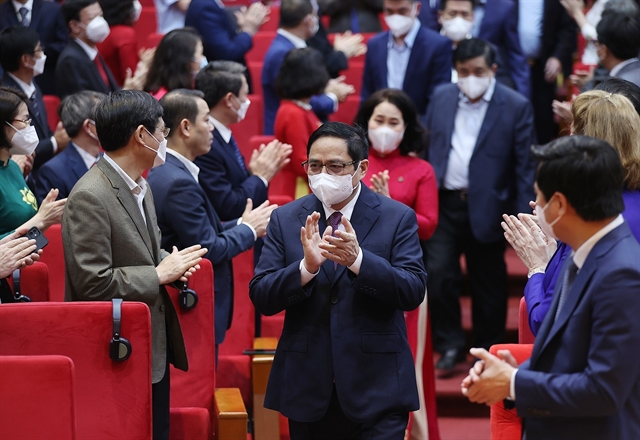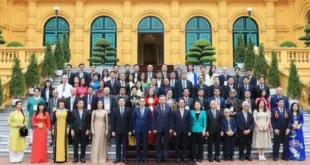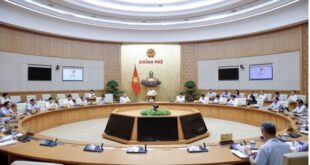
HÀ NỘI — Prime Minister Phạm Minh Chính has ordered the head of each locality in the country to take more responsibility for directing and understanding statistical work so that the sector really becomes “the ears and the eyes” of the Party and State.
Statistical work plays a very important role in assessing and making policies, he said.
PM Chính gave the instruction at an online national statistics conference on Thursday morning, themed: “Strengthening discipline, improving quality and efficiency.”
The virtual conference was attended by over 14,000 statisticians, officials and heads of district and provincial levels from all 63 provinces and cities nationwide.
He also said that the General Statistics Office of Việt Nam (GSO) and agencies need to raise awareness of statistics work to improve the quality and efficiency of statistical work.
The statistical work must ensure honesty, accuracy, completeness, timeliness, transparency, continuity and integration, he said.
Statistical data has to be analysed, evaluated, forecasted and used effectively for policy formulation and planning, he said.
PM Chính also required the statistical sector to further improve the quality of civil servants, restructure the staff force and build a lean and efficient apparatus.
It needs to pay more attention and invest in the statistical sector, especially investing in digital transformation in statistical activities. Technology platforms must be combined to effectively serve statistical activities, he said.
Relevant ministries, sectors and localities have to closely and effectively coordinate in statistical work, he said.
It should promote extensive international cooperation in the field of statistics in the future, he said.
Achievements
A report at the conference reveals that the statistical sector has achieved remarkable results recently.
The system of legal documents on statistics was revised in a timely manner, close to actual conditions and effectively implemented.
The Law on Statistics has been developed and revised three times and the decrees to instruct the implementation of the law were issued immediately after that, creating a synchronous legal corridor for the smooth implementation of statistical activities, the report said.
The qualifications and capacity of the statisticians have been increasingly improved to meet professional statistics. Over 95 per cent of civil servants and public employees working in the statistical sector have university degrees or higher.
The statistical sector’s information collection activities have been applied to information technology in all stages. Thanks to the application, it had shortened half of the processing time and cost in the 2019 Population and Housing Census and the 2021 Economic Census compared to previous census periods.
The statistics activities have ensured the provision of regular and irregular information for the management and administration of leaders of the Party, State, ministries, sectors and local authorities through reports on socio-economic developments.
Statistical data already used in the evaluation and summary of the 10-year socio-economic development strategy 2011-20, the five-year socio-economic development plan 2016-20, the formulation of 10-year socio-economic development strategy 2021-30 and five-year socio-economic development plan 2021-25, at both central and local levels.
The data was also used in national and local master planning.
The development strategy of the sector and major statistical projects have been implemented nationwide, creating a solid foundation for short-term and long-term statistical work.
International cooperation in statistics has been expanded in the direction of extensive integration, contributing to improving the capacity and position of the nation’s statistical sector, the report said.
Infrastructure and funding for statistical activities are supported at both the central and local levels; promoting digital transformation in management activities, contributing to building e-Government, the report said.
Caitlin Wiesen, United Nations Resident Coordinator in Việt Nam, said at the conference that she would like to congratulate Việt Nam’s National Statistical System, especially the GSO, for all the impressive achievements that have been made so far in strengthening the national statistical capacity.
The overall statistical capacity index increased two levels in the last 10 years, ranking Việt Nam 5th among nine countries in Southeast Asia, she said.
In 2021, noticeably, the amended Law on Statistics with the updated list of national statistical indicators and the Việt Nam Statistical Development Strategy 2021-30 were endorsed, setting important legal frameworks and ambitious goals for the country’s statistical development, she said.
In the last year, GSO also provided crucial statistics and statistical analysis for the development of Việt Nam’s new Socio-Economic Development Strategy and Plan (SEDP), as well as the Government’s development of Việt Nam’s COVID recovery growth scenarios and support packages to the Vietnamese people most affected by the pandemic, she said.
She also suggested three areas which the UN believes are critical for the national statistics system, consisting of improving national administrative databases and inter-agency collaboration to complement censuses and surveys; investing more in new innovative data sources, collection and sharing methods to assist the government in delivering timely policy responses; as well as strengthening Sustainable Development Goal monitoring and further aligning Việt Nam’s statistics with international statistics standards and norms. — VnExpress News
- Reduce Hair Loss with PURA D’OR Gold Label Shampoo
- Castor Oil Has Made a “Huge” Difference With Hair and Brow Growth
- Excessive hair loss in men: Signs of illness that cannot be subjective
- Dịch Vụ SEO Website ở Los Angeles, CA: đưa trang web doanh nghiệp bạn lên top Google
- Nails Salon Sierra Madre
 VnExpress News The News Gateway of Vietnam
VnExpress News The News Gateway of Vietnam





